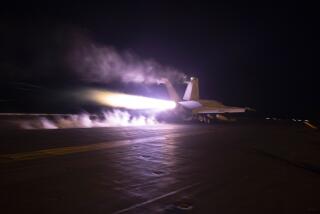A Blunt Response to Iraqi Trickery : But Arab sympathies may still tempt Hussein
- Share via
Resumed and intensified Western air attacks on Iraq in the last few days are a reminder to Saddam Hussein that whatever provocations he may conceive to try to bolster his political position, his country’s military vulnerability remains a fact he can’t evade or deny.
U.S.-led raids on anti-aircraft sites in northern and southern Iraq, where Iraqi planes have been prohibited from flying by the Western allies, have a limited but vital tactical purpose. That is to insure the safety of the allied air patrols sent aloft to make sure Baghdad isn’t using its own air force to attack the Kurdish minority in the north or the Shiites in the south. Washington says the legal basis for this humanitarian effort is U.N. Security Council Resolution 688, which condemned Hussein’s repression of minorities.
Sunday’s U.S. Tomahawk cruise missile attacks on an industrial complex south of Baghdad had a much broader strategic goal.
For nearly two years Iraq has tried to hide as much as it could of its surviving capability to build and stockpile weapons of mass destruction. Under the U.N. resolution that halted the Persian Gulf War, Iraq was to identify and accede in the destruction of all its nuclear, chemical and biological warfare sites, as well as its long-range missiles.
Baghdad’s cooperation with the U.N. inspectors has, however, been grudging at best and lately its behavior has become flagrantly evasive. The latest Iraqi challenge came with its claim that the safety of U.N. inspectors could be guaranteed only if they used limited air access routes dictated by Baghdad. This is a clear violation of its commitment to abide by U.N. resolutions. The cruise missile attacks were a blunt and legitimate response, a reminder that destructive alternatives exist to on-site inspections of suspect facilities.
President-elect Bill Clinton says he fully supports the U.S. actions, and promises American support for the U.N. resolutions on Iraq won’t soften after he takes office Wednesday. Meanwhile, however, Saddam Hussein’s probing of Washington may be gaining him some political advantage closer to home.
It’s clear that the grand international military coalition that was hammered together to repel Iraq’s invasion of Kuwait in 1990 has now effectively been reduced to the United States, Britain and France--the latter two playing only limited roles--with the nervous and limited cooperation of Saudi Arabia and other Gulf states. Elsewhere in the Arab world, sympathy--if not active support--for Iraq seems to be growing. Partly this is a return to the ancient sense of solidarity that manifests itself whenever an Islamic state is perceived to be in confrontation with the West. Partly it is a worry that if Iraq becomes too weakened militarily the gainer will be neighboring non-Arab Iran, whose encouragement of Islamic radicalism nearly all Arab states fear. These rising signs of increasing Arab political sympathy may be enough to tempt Hussein into still greater challenges to Washington in its role as chief military enforcer of the U.N.’s political will.
More to Read
Sign up for Essential California
The most important California stories and recommendations in your inbox every morning.
You may occasionally receive promotional content from the Los Angeles Times.













